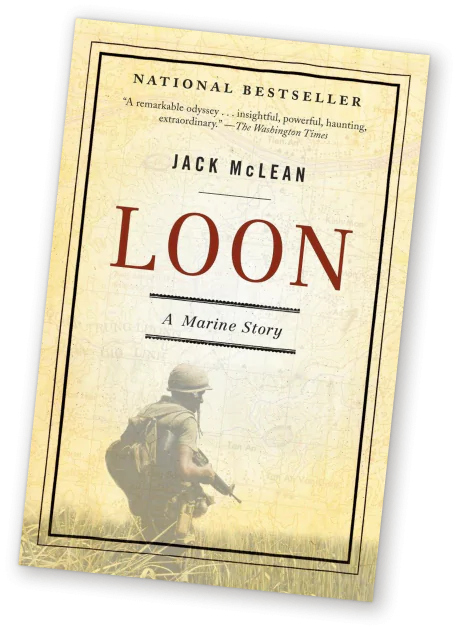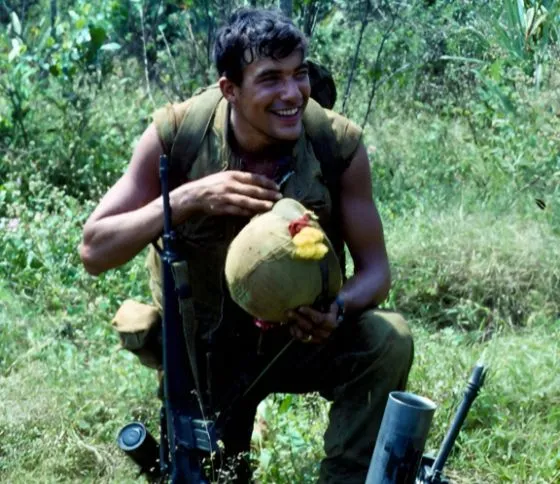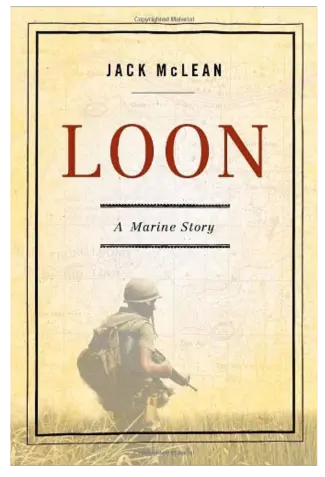LOON: A Marine Story is Jack McLean’s powerful, first-hand account of some of the most tumultuous events in our history, both on the Battlefields in Vietnam and back home in America.


Dive into ‘LOON: A Marine Story’ to explore the journey of a boy from suburban comfort to the front lines of Vietnam, revealing a gripping tale of courage and transformation in America’s most controversial war.
“Kids like me didn’t go to Vietnam,” writes Jack McLean in his compulsively readable memoir. Raised in suburban New Jersey, he attended the Phillips Academy in Andover, MA, but decided to put college on hold. After graduation in the spring of 1966, faced with the mandatory military draft, he enlisted in the United States Marine Corps for a two-year stint. “Vietnam at the time was a country, and not yet a war,” he writes. It didn’t remain that way for long.
A year later, after boot camp at Parris Island, South Carolina, and stateside duty in Barstow, California, the Vietnam War was reaching its peak. McLean, like most available Marines, was retrained at Camp Pendleton, California, and sent to Vietnam as a grunt to serve in an infantry company in the northernmost reaches of South Vietnam. McLean’s story climaxes with the horrific three-day Battle for Landing Zone Loon in June, 1968. Fought on a remote hill in the northwestern corner of South Vietnam, McLean bore witness to the horror of war and was forever changed. He returned home six weeks later to a country largely ambivalent to his service.
Written with honesty and insight, LOON is a powerful coming-of-age portrait of a boy who bears witness to some of the most tumultuous events in our history, both in Vietnam and back home.
Following the reflective and poignant narrative of “LOON: A Marine Story,”FOUND” serves as a powerful companion piece, furthering McLean’s exploration of his journey before, during, and after Vietnam. Where “LOON” offers an unflinching look at the realities of combat, “FOUND” seeks closure and understanding in the peace that follows, showcasing McLean’s growth and evolution as a person.
Jack McLean is the author of the national bestselling memoir LOON: A Marine Story (Random House, 2009) and FOUND: A Veteran Story (HBP 2023.).
Born in Huntington, NY, he was brought up in Summit, NJ. After graduation from Phillips Academy Andover in 1966, he enlisted in the United States Marine Cops. In the fall of 1968, he became the first Vietnam veteran to enter Harvard University. His thirty-year marketing career included senior positions with insurance broker Johnson & Higgins in Boston, Portland, and Charlotte. He later served as the founding managing partner of the Greater Washington (DC) Initiative.
Years after returning from Vietnam, and unknowingly Battling with PTSD, and the after-effects of Agent Orange, Jack began his road to realization, which paved the road to recovery. Jack decided to write his memoirs to help others facing similar challenges as ones that Jack has overcome.
McLean and his wife Nina live in Huntington. Jack has three daughters, Sarah, Martha, and Sylvia.
LOON: A Marine Story is available in paperback, on Kindle, and Audible.
Readers interested in gripping tales of bravery, the intricacies of military history, and the profound personal stories from the Vietnam War will find “Loon” deeply compelling.
Genres: military memoir, military biography, books about marines in Vietnam, books about the Vietnam War, books about the military, veterans day books, books for veterans
Preface
During the first week of June 1966, artist Andy Warhol was shot and critically wounded in New York. Sixty five blocks uptown, most of the senior class at Columbia University walked out of their commencement ceremony in protest of the Vietnam war. Half a world away, several hundred United States Marines were being airlifted onto a hilltop code named LZ Loon – the last place on earth that many would ever see. Several days later, Senator Robert F. Kennedy was assassinated in Los Angeles.
Chapter 1
The Marines of Charlie, Delta, and H&S Company fight for their survival on the third day of the horrific battle for LZ Loon.
Chapter 2
Raised in upper middle class Summit, New Jersey during the post World War II 1950’s and 60’s, Jack McLean had an idyllic childhood. The period is capped by President John F. Kennedy’s inauguration speech extolling national service. The civil rights movement and the quiet escalation of American involvement in south Vietnam were ominous undercurrents of the divisive times to come. In September 1962, McLean enrolls in Phillips Academy in Andover, Massachusetts.
Chapter 3
Home on spring break in Brookline Massachusetts in March 1966. McLean learns that he has been rejected at the colleges to which he applied. Having struggled academically at Andover, he considers forgoing college for two years and joining the military.
Chapter 4
To the shock of his family, McLean enlists in the United States Marine Corps. He will go on active duty after graduation in June.
Chapter 5
Returning to Andover to the stunned disbelief of his teachers and friends, McLean notes that most of his classmates will be attending elite universities in the fall. He receives a letter of encouragement from a distant cousin of his mother who is serving with the Marine Corps in Vietnam.
Chapter 6
In August he takes the train from Boston to the infamous Marine Corps boot camp at Parris Island, South Carolina. The arrival and early days of indoctrination provide a stunning contrast to his past life and an eerie foreboding about the months to come.
Chapter 7
After several weeks of training, McLean finds himself in what he considers to be an intractable situation. Having been beaten by a drill instructor, he writes a letter to a former teacher describing the incident. The letter comes to the attention of the military leadership and he is called to an inquisition in front of a group of senior officers. Wanting to neither anger the drill instructor nor prolong his stay on Parris Island, he denies that the incident ever happened.
Chapter 8
In October, the graduating Marines are assigned their military occupations and duty stations. After an additional month of advanced training at Camp Lejeune, North Carolina, most will be sent directly to Vietnam to serve in the infantry. The Vietnam War had dramatically escalated while they were isolated in training. McLean’s assignment was to attend supply school at Camp Lejeune.
Chapter 9
In November 1966, with infantry training complete, McLean returns home for a month of leave. After a visit to see an Andover friend now in college and attendance at his family’s annual Thanksgiving, he becomes aware of how dramatically his life has changed.
Chapter 10
Supply school at Camp Lejeune is followed by assignment to the Marine Corps Supply Center in Barstow, CA. Diversions are provided by occasional weekend trips with his buddy Sid Macleod to Los Angeles and Las Vegas.
Chapter 11
McLean returns home for annual leave. One day he drives up to Andover to speak with their college advisor about his post Marine Corps college prospects. He decides to apply to Boston University and Harvard the following fall.
Chapter 12
Returning to Barstow, McLean immediately receives Official Orders join an infantry unit in Vietnam. Before departing, he must spend several months of intense combat training at Camp Pendleton, California.
Chapter 13
That fall, like all Vietnam-bound Marines, he attends two weeks of Pre Vietnam staging at Camp Pendleton.
Chapter 14
In late October, McLean departs for Vietnam. He will have a three day lay over in Okinawa. He describes his family background in Southeast Asia.
Chapter 15
After arriving in Danang, McLean is assigned to Charlie Company, 1st Battalion, 4th Marines, 3rd Marine Division – an infantry unit that was currently deployed near the DMZ that separated North and South Vietnam. Several days later, he endures his first day of real combat.
Chapter 16
After several miserable days of combat and cold rainy weather, Charlie Company treks east along the DMV to a bridge security position south of Con Thien. There they celebrate Christmas, have mail and hot chow flown in, and begin several months of relative calm. Back home, there is unsettling news news of increasingly active anti-war activity on college campuses.
Chapter 17
The relative calm continued through the winter, but not elsewhere. There was news of the USS Pueblo being hijacked by North Korea. The Tet offensive swept through most of the major cities and towns in South Vietnam. Several squads from Charlie’s sister Delta company successfully repelled an onslaught on the nearby village of Cam Lo. McLean sees the horrific scene the following morning. Machine gunner Corporal Larry Maxam is the only casualty. He later receives the Medal of Honor for his bravery that night.
Chapter 18
Charlie Company Marines receive news that President Johnson, their Commander in Chief, will not run for reelection.
Chapter 19
McLean gets an acceptance letter from Harvard. He will enter in September. He then departs for five glorious days of R&R in Singapore. There he reads the news of the campus riots at Columbia University. He notes that several of his Andover classmates are among the leaders. After returning to the field, he learns that his close friend Sid Macleod had been killed at Khe Sanh.
Chapter 20
In late April, Captain Bill Negron takes over as Charlie Company Commander. An experienced Marine, he notes that his new charges had become lax after the winter of little combat activity. He brings them back up to fighting strength during the coming month in anticipation of the anticipated summer offensives to come. In late May, they take up road security positions along Route 9 near the Camp Carrol combat base.
Chapter 21
The Marines spend an anxious last day preparing themselves and their gear in preparation for being airlifted the onto a rugged hillside near the Laotian border that had become an enemy stronghold.
Chapter 22
Waves of choppers take Charlie and Delta Companies to a firebase that became known as LZ Loon. The landing is hectic and disorienting. After establishing the perimeter, several days of supplies and ammo are dropped in. LZ Loon was made up of two adjacent ridges. Delta occupied one and Charlie the other. As night fell, they could hear the enemy moving about in the jungle below.
Chapter 23
The following morning, several more squads of Marines are dropped onto the hill. Early in the afternoon, a devastating artillery and rocket barrage begins. By late afternoon, a dozen Charlie Company Marines had been killed and several dozen more injured. To tighten the perimeter, the Marines of Charlie Marines grab everything that they could carry and join Delta Company on the adjacent ridge.
Chapter 24
At dawn, the last Charlie Company squad trying to make it to the new hill was ambushed and the squad leader was killed. The battle began and raged throughout the day as the enemy pressed their ground attack. The two besieged companies received artillery and air support, but were still outmanned. Elements of the Delta Marines were engaged in hand to hand combat with the enemy. My late afternoon, two helicopters had been shot down and the death toll for the two companies had reached 42 boys. Another hundred had been wounded. Thanks to the extraordinary valor of several Marine Corps helicopter crews, the remaining survivors were successfully evacuated from the hill by nightfall. Most of the dead were inaccessible and left behind.
Chapter 25
The flowing day, the disparate elements of Charlie and Delta companies are reunited. The horror of the past three days – who was was killed, who was injured, and who was missing in action – is recounted. Replacement Marines being to flow in as Charlie Company is relocated to LZ Robin. Eleven days later, elements of the company, with heavy air and artillery protection, are airlifted back to LZ Loon to retrieve the dead bodies. News of the Loon battle become news back home. A picture of the body retrieval appears on the front page of the New York Times. McLean’s endures his final month in country in the sweltering heat and low unit morale.
Chapter 26
In late July, McLean departs from Charlie Company and heads to Danang for his flight home. The following day, he departs for Okinawa and California’s Travis Air Force Base. While waiting of the curb for several hours for his sister to come up from San Francisco to pick him up, he reflects on his Marine Corps service and his time in Vietnam. Several days later, he visits the amputee ward of the Oakland Naval Hospital to visit with several of the boys wounded on Loon.
Chapter 27
After being discharged from San Francisco’s Treasure Island Naval Station, McLean dons a uniform with his new medals and flies home to Boson. Exhausted after an all night flight, he is met at the airport by his parents and taken home to begin a disorienting return to civilian life.
Chapter 28
Seven years later, having graduated from college and moved to New York, McLean hears the news that Danang has fallen to the North Vietnamese Army. He writes a long letter home reflecting on his experience.
Chapter 29
Weeks after returning home, disoriented and alone, McLean becomes the first Vietnam veteran to resister at Harvard University.
Chapter 30
Over the next several months, McLean comes to understand that the country is ambivalent about the service of all Vietnam veterans. From that point on, he rarely shares the information publicly. He writes a condolence letter to Sid Macleod’s parents and, several months later, hears back from his mother.
Epilogue
McLean reflects on his academic year which was successful, and his continuing adjustment to being home. Three years later he receives his Honorable Discharge from the United States Marine Corps in the mail.
